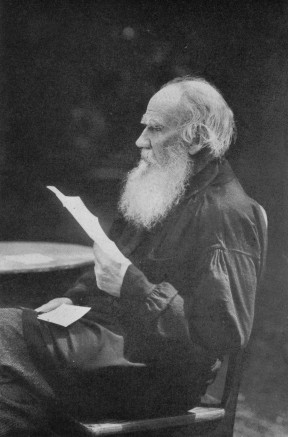
Edward Winter
Gerhard Henschel’s 1959 book Freude am Schach was discussed in C.N. 3533 in the context of two highly dubious games claimed by him to have been played by Einstein and Stalin. On pages 93-94 of the same book Henschel gave a game purportedly won by Leo Tolstoy (1828-1910) from a royal opponent (‘gegen den Fürsten Ivkoff’): 1 e4 e5 2 d4 exd4 3 c3 dxc3 4 Bc4 cxb2 5 Bxb2 d6 6 Qb3 Qe7 7 Nc3 Nd7 8 Nf3 Nc5 9 Qc2 Be6 10 Nd5 Bxd5 11 Bxd5 Nf6 12 O-O c6 13 Bc4 Rd8 14 Rfe1 Ne6 15 e5 dxe5 16 Nxe5 g6 17 Nxf7 Qxf7 18 Rxe6+ Kd7 19 Rd1+ Kc7 20 Be5+ Bd6 21 Rexd6 Qe7 22 Rd7+ Kb6 23 Bc7+ Kc5 24 Be2+ Kb4 25 Qb3+ Kc5 26 Qc4 mate.

Count Leo Tolstoy
Anyone making a check of Tolstoy games runs into instant chaos. For instance, page 413 of Şah Cartea de Aur by Constantin Ştefaniu (Bucharest, 1982) had a game which began 1 e4 e5 2 f4 exf4 3 Nf3 g5 4 Bc4 g4 5 Ne5 Qh4+ and was won by White at move 21. It was headed ‘Lev Tolstoi – E. Mood, Iasnaia Poliana, 1908’. Moreover, databases have the following: S. Lebedev v L. Tolstoy, correspondence, Russia, 1900 (a game which started 1 d4 d5 2 c4 dxc4 3 Nf3 Nf6 4 e3 Bg4 5 Bxc4 e6 and was won by Black at move 39) and L. Tolstoy v A. Romashkevich, correspondence, Russia, 1901 (which opened 1 e4 e5 2 Nf3 Nc6 3 c3 d5 4 Qa4 f6 5 Bb5 Nge7 and was won by White at move 60). In each case the full score is on offer, but we dislike reproducing games from databases unless a reliable old source can be found. As will be shown later on, moreover, Leo Tolstoy was not the only chess-playing member of his family, and we are currently by no means sure that he played those, or any other, correspondence games.
Nor are snippets about Leo Tolstoy in chess magazines necessarily informative or reliable. The following paragraph appeared on page 168 of the May 1897 BCM:
‘Count Tolstoi, who is now staying at St Petersburg, is said to be devoting himself enthusiastically to the study of chess. It is reported that he and his wife and children are playing as if their lives depended on the results. The tables in the various rooms are marked out as chess boards, and the dogs and other pets are named after the chess pieces. This sort of thing of course cannot last.’
The first instance we have so far traced of a game by Tolstoy appearing in print is an article in the Rigaer Tageblatt, subsequently reproduced on pages 157-158 of the May 1907 Deutsche Schachzeitung and in a feature ‘Tolstoi als Schachspieler’ on pages 20-21 of Schachjahrbuch für 1907. II. Teil by L. Bachmann (Ansbach, 1908). This is Tolstoy’s best-known game, against Aylmer Maude (1858-1938), who was his biographer and translator. It was stated to have been played the previous October, and the moves were given as follows: 1 e4 e5 2 f4 exf4 3 Nf3 g5 4 Bc4 g4 5 Ne5 Qh4+ 6 Kf1 d5 7 Bxd5 f3 8 gxf3 Qh3+ 9 Ke1 g3 10 d4 g2 11 Rg1 Qh4+ 12 Ke2 Nh6 13 Rxg2 c6 14 Bxh6 cxd5 15 Bxf8 Kxf8 16 Qe1 Qe7 17 Nc3 f6 18 Nxd5 Qd6 19 Qg3 Resigns. This, of course, is the game published by C. Ştefaniu with the wrong date and the wrong spelling of Black’s name.
Maude wrote a two-volume biography of Tolstoy, and this game (continued with 19...fxe5 20 Qg7+ Ke8 21 Qxh8+ ‘and wins’) was one of two that he presented on pages 673-675 of the second volume, The Life of Tolstoy Later Years (London, 1910). His introductory paragraphs read:
‘Games played, as these were, rapidly, amid conversation, and when one of the players had been travelling all the preceding night, cannot have much interest as specimens of good chess. But as showing the kind of skittle game a great writer who only plays when he is too tired to work, played at the age of 78 and 81, they may be worth recording.In the first game, played in 1906, Tolstoy, who knows nothing of the chess books, took me quite by surprise by playing the Salvio Gambit. He had, it turned out, picked it up from a friend who had recently played it on him. I knew nothing about that opening, and made a very poor fight of it.’
Maude stated that the second game, in which he was White, was played in 1909 and went as follows: 1 e4 e5 2 Nf3 Nc6 3 Bb5 a6 4 Ba4 b5 5 Bb3 Nf6 6 Ng5 d5 7 exd5 Nxd5 8 Nxf7 Kxf7 9 Qf3+ Ke6 10 Nc3 Nb4 11 a3 Bb7 12 axb4 Ra7 13 Qg4+ Kd6 14 Ne4+ Kc6 15 Qe6+ Bd6 16 Bxd5+ Kb6 17 Bxb7 Rxb7 18 d3 Ka7 19 Be3+ Kb8 20 Rxa6 Re8 21 Qa2 c6 22 Ra8+ Kc7 23 Qa5+ Kd7 24 Rxd8+ ‘and wins’.
Maude’s two-volume work had a number of other references to chess, and we begin with those in volume one, The Life of Tolstoy First Fifty Years (London, 1908):
Page 77:
‘He had a third chance of securing it [a St George’s Cross for bravery] later on, but this time, absorbed in playing chess till late at night, he omitted to go on duty, and the Commander of the Division noticing his absence, placed him under arrest and cancelled the award which had been already made in his favour. Chess, I may here mention, has always been a favourite game of Tolstoy’s. He has never studied the game from books, but has played much and plays well.’
Page 119:
‘One evening [in Sevastopol], while Tolstoy was sitting with the adjutants of Count Osten-Saken, Commander of the Garrison, Prince S.S. Ourousof [Urusov], a brave officer and first-rate chessplayer (he took part in the International Chess Tournament of 1862, in London [sic - he did not]) and a friend of Tolstoy’s, entered the room and wished to speak to the General. An adjutant took him to Osten-Saken’s room, and ten minutes later Ourousof passed out again, looking very glum. After he had gone, the adjutant explained that Ourousof had come to suggest that a challenge should be sent to the English to play a game of chess for the foremost trench in front of the Fifth Bastion: a trench that had changed hands several times and had already cost some hundreds of lives. Osten-Saken had naturally refused to issue the challenge.’
Pages 166-167 of King, Queen and Knight by N. Knight and W. Guy (London, 1975) quoted from a letter dated January 1899 from Tolstoy to a friend in which he related this incident.
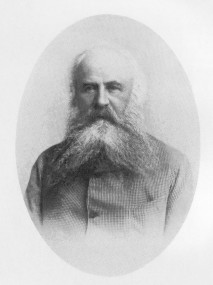
Prince S.S. Urusov
Page 389 of the first volume of Aylmer’s work quoted an unidentified lady regarding an episode in 1878:
‘Knowing that he was fond of chess, the Countess Tolstoy asked [Ivan Tourgenef/Turgenev] to play a game with her eldest son, a lad of 15, saying, “He will all his life remember having played with Tourgenef.”
Tourgenef condescendingly agreed, and began a game, while continuing to talk to us.
“In Paris I often used to play chess and was considered a good player. They called me le chevalier de pion. I am fond of pawns. ... Do you know the new phrase, now in fashion among the French – vieux jeu? Whatever you say, a Frenchman replies, ‘Vieux jeu!’.”
“Eh! but one must not joke with you”, he exclaimed suddenly, turning to his youthful opponent. “You have all but done for me.”
And he began to play carefully, and only won the game with difficulty, for young Tolstoy really played chess excellently.’
The above passage resulted in a remarkable misunderstanding when it was cited, under the title ‘Tolstoy’s chess in youth’, on page 82 of King, Queen and Knight. The compilers, Knight and Guy, did not realize that the text was a quote (by the unidentified lady) and was not written by Maude himself and that, above all, the passage was not about Leo Tolstoy. Maude made it clear that the 15-year-old chessplayer referred to was Sergius (or Sergei) L. Tolstoy (born 1863), Leo Tolstoy’s eldest son. In a footnote on the same page Maude wrote: ‘In later years Sergius L. Tolstoy won a correspondence game from Chigorin when the latter was the Russian chess champion.’
The next set of quotes comes from volume two, The Life of Tolstoy Later Years (London, 1910).
Pages 529-530:
‘His favourite indoor game is chess, which he plays in what seems to me the best possible way. I do not mean that he could often beat a strong club player, but that he takes his game also just as recreation, and not as a study. He spends no time on chess literature, and willingly plays in a room full of people. To make a special study of chess would be impossible for a man with so many vivid and pressing interests in life. From lack of book-knowledge, he was often weak in the openings, but was sometimes very ingenious in snatching an advantage. In fact, in chess as in all things he displayed originality and great alertness.
Like most people who came under his influence, I was violently swung from my former habits, and found it difficult to adjust myself to my new perceptions. For instance, on awakening to the immensity and urgency of the reforms which could be accomplished if we utilized our opportunities – from being a frequent attendant at the chess club, I forswore it as a luxury and waste of time. But it so happened that Lasker and Steinitz came to Moscow that winter, to play their match for the world’s championship; and at Tolstoy’s someone suggested that we should go to see them play. Tolstoy agreed, but I objected, on the score that professional chess, with its jealousies and bickerings and its diversion of ability to the service of a mere game, was contrary to the trend of his teaching. Without making any fuss about it, Tolstoy just said to the others: “Do you know, I think I won’t go. Maude, here, thinks it would not be good.” I am now ashamed to have hindered his seeing a first-class example of a game he has always been fond of; but nearly everyone who was swept into the strong current of his movement got things out of focus and proportion, at least for a while.’
Page 611:
‘His physical weakness was very noticeable at this time [1902], but almost the only sign of mental debility was that he had abandoned his favourite game of chess.’
Pages 627-628:
‘He spent the evening with the family, one sign of the improvement in his health being that he again played chess; and I was told that he did so every evening that he could find a partner. [Maude states that the Salvio Gambit game was played that evening, i.e. in Yasnaya in October 1906.] It seems to me that Tolstoy shows an excellent sense of proportion in his way of playing chess. He does it well enough to make and to enjoy combinations, but he never sacrifices social family life for the sake of the game. Anyone may interrupt him while he is playing, and he talks and jests so that no-one who only knew the game at Yasnaya would consider chess unsocial. Previously I (who had made some study of the game) used generally to beat him; but on this occasion he won two games from me very rapidly.’
Pages 640-641 (concerning September 1909):
‘He complained that his faculty for remembering names was failing, and that in writing he found it difficult to avoid repeating himself, as he could not remember what he had already said; but his conversation was still pointed, animated and vigorous, and he played chess in the evening, almost as he had done when I first played with him, 15 years before.’
Another book by Maude was Leo Tolstoy (London, 1918). From page 255:
‘An amusement we were both fond of was chess. He made it a social game by playing in a room full of people and not objecting to interruptions. He had no book-knowledge of it, but had played much and was alert and ingenious. I do not think a first-class professional player could have given more than the odds of a knight.’
Below is an inscription by Maude in a further book of his in our collection, Tolstoy and His Problems (London, 1902):
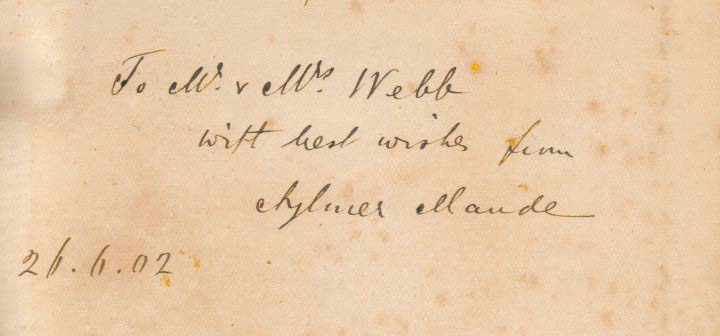
A third game between the two men was published on page 70 of the February 1933 BCM:
‘Aylmer Maude sends us a game which he played with the famous Russian novelist at his home, Yasnaya Polyana, the year before his death. Count Tolstoy was then 81, and an invalid, who had to be wheeled about in a bath-chair. He was, moreover, much distressed by his wife’s mental condition at the time. Mr Maude, therefore, attaches no importance to the game, except as being one of the very few recorded games of Tolstoy’s (he gave two in his Life of Tolstoy) and as never having been published before. We append the game, with Mr Maude’s notes:
Leo Tolstoy – Aylmer Maude
Yasnaya, 1909
King’s Gambit Accepted1 e4 e5 2 f4 exf4 3 Nf3 g5 4 Bc4 Bg7 5 h4 g4 6 Ng5 Nh6 7 d4 O-O (7...f6, in a game of Morphy’s against Meek, led to a win for White ...) 8 Bxf4 d6 9 Nc3 Nc6 10 e5 (This gives away a pawn.) 10...dxe5 11 dxe5 Nxe5 12 Qxd8 Rxd8 13 Bxe5 Bxe5 14 O-O Bf5 15 Rae1 Bd4+ 16 Kh1 Rd7 17 Nd5 Kg7 18 Nf4 Rad8 19 Nh5+ Kg6 20 Ng3 Bxc2 21 Rc1 Ba4 22 Rf4 (A mistake which loses the game. Under the circumstances in which the game was played it would have been strange had Tolstoy not made a slip.) 22...Be3 23 Bd3+ Rxd3 24 Rxa4 Bxc1 25 Ra5 Rd1+ 26 Kh2 Bf4 27 Ne4 Re1 28 Ra4 Rdd1 29 Nf2 Bd6 30 Nxd1 Rxd1 and wins.’
Following Tolstoy’s death in November 1910, the American Chess Bulletin (January 1911, page 12) published ‘one of four games Count Tolstoy played in a series of games against Fritz Kuhler, a German amateur’: 1 e4 e5 2 Nf3 Nc6 3 Bc4 Bc5 4 c3 Nf6 5 d4 exd4 6 cxd4 Bb4+ 7 Nc3 Nxe4 8 O-O Nxc3 9 bxc3 Bxc3 10 Qb3 Bxa1 11 Bxf7+ Kf8 12 Bg5 Ne7 13 Re1 d5 14 Bxd5 Qd7 15 Bxe7+ Qxe7 16 Rxe7 Kxe7 17 Qe3+ Kd8 18 Qg5+ Ke8 19 Qxg7 Rf8 20 Ng5 h5 21 Nh7 Rf5 22 Nf6+ Rxf6 23 Qxf6 Bb2 24 Bf7+ Kf8 25 Bg6+ Kg8 26 Qf7+ Kh8 27 Qh7 mate. The Bulletin stated that it was ‘indebted to the Manchester Evening News for the score’, and we have yet to find a proper source, or to trace any of the three other games allegedly played between Tolstoy and Kuhler. Pages 40-41 of the February 1911 Bulletin had a feature entitled ‘The Chess Prowess of Tolstoy’ which related an anecdote or two and gave, from Bohemia, the short win by Tolstoy against Maude. It quickly became the most popular choice of a Tolstoy game for magazines to quote, also appearing on, for instance, pages 21-22 of the January 1911 issue of La Stratégie and in the Wiener Schachzeitung, August-September 1913, page 239. In each case it was stated that Black resigned after 19 Qg3, contrary to the version given by Maude himself.
Rather surprisingly, we found no quotable references to chess in Reminiscences of Tolstoy ‘by his son Count Ilya Tolstoy’ (New York, 1914). The grounds for the surprise are, firstly, that the book contains the now-familiar photograph of ‘Tolstoy enjoying a game of chess’ (taken in 1908 and showing Tolstoy playing against his son-in-law M. Sukhotin, according to page 227 of A History of Chess by J. Giżycki):
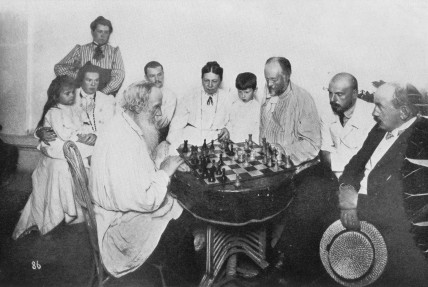
The second cause for surprise is that Ilya Tolstoy was himself a chess enthusiast. From page 11 of The Gambit, January 1929:
James Allen Anderson – Ilya Tolstoy‘Count Ilya Tolstoy, second son of the famous Russian author and novelist, played an exhibition game of chess 10 January 1929 with J.A. Anderson, city chess champion, following a lecture at the Downtown YMCA, St Louis, MO.
... Count Tolstoy has played with chessplayers the world over and knows personally such players as Alekhine, Capablanca, Lasker and Bogoljubow.’
1 e4 e5 2 Nf3 Nc6 3 Bb5 Nf6 4 O-O Nxe4 5 d4 exd4 6 Re1 d5 7 Nxd4 Qf6 8 f3 Bc5 9 c3 O-O 10 Bxc6 bxc6 11 fxe4 Qg6 12 Be3 Bg4 13 Qc2 Rae8 14 Nd2 Bh3 15 Nf1 dxe4 16 Qf2 Bxd4 17 Bxd4 f5 18 Qg3 Bg4 19 h3 Bh5 20 Qxg6 Bxg6 21 Bxa7 f4 22 Bd4 Rf5 23 b4 Rg5 24 Kh2 Rf8 25 Nd2 e3 26 Nf3 Rgf5 27 Nh4 Rg5 28 Nxg6 Rxg6 29 Rf1 Rg5 30 a4 Rgf5 31 a5 e2 32 Rf2 f3 33 Rxf3 Rxf3 34 gxf3 Rxf3 35 Re1 Resigns.
The above game-score was also given on page 30 of the February 1929 American Chess Bulletin, accompanied by this photograph of the occasion:
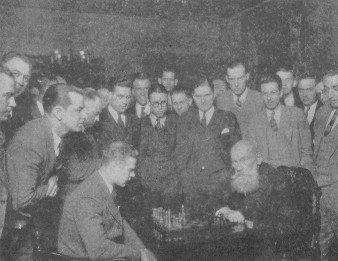
Two further photographs are added below. The first is a shot of Leo Tolstoy at the board, well known from its appearance in such books as The Soviet Chess School by A. Kotov and M. Yudovich (Moscow, 1983), whereas the second shows his two chess-playing sons Sergei and Ilya:
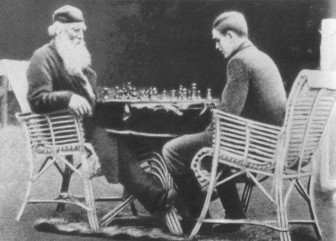
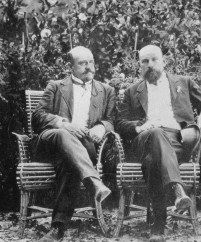
In conclusion, the main issue requiring clarification is which published games said to involve Leo Tolstoy are genuine. There seems no reason to dispute the authenticity of the three against Maude, but what of the others? Was the game against Ivkoff, given by Henschel, an invention? Were the two correspondence games played by Leo Tolstoy, or by one of his sons? And what can be discovered about the games allegedly played by Leo Tolstoy against Fritz Kuhler?
(3667)
From Jack O’Keefe (Ann Arbor, MI, USA):
‘Your doubts as to whether the Tolstoy correspondence games were played by Leo Tolstoy were well founded. On 27 March 1900 (all dates here are old style) the chess column in Novoe Vremia (page 5) listed some of the participants in its Fifth Correspondence Tournament. They included I.A. Zybin, B.I. Tabunshchikov, K.K. Betins, N.E. Kalinsky, A.I. Romashkevich, A.V. Henrichsen and four amateurs. As games from the tournament were printed over the following months it became clear that one of the amateurs was Leo Tolstoy’s son, Sergius (or Sergei) Tolstoy.’
Mr O’Keefe has provided all five games involving Tolstoy’s son which were published in Novoe Vremia. The first and third ones were mentioned in C.N. 3667 as being available in databases.
Sergei Lebedev – Sergius/Sergei L. Tolstoy
Correspondence (January – August 1900)
Queen’s Gambit Accepted
1 d4 d5 2 c4 dxc4 3 Nf3 Nf6 4 e3 Bg4 5 Bxc4 e6 6 Qb3 Bxf3 7 gxf3 b6 8 Rg1 c6 9 Nc3 b5 10 Be2 a5 11 Bd2 g6 12 Rc1 a4 13 Qc2 Nd5 14 Nxd5 exd5 15 e4 Bg7 16 e5 O-O 17 Bd3 Qe7 18 a3 Bxe5 19 dxe5 Qxe5+ 20 Kf1 Qxh2 21 Bxg6 Qh3+ 22 Ke2 Qe6+ 23 Be4+ Kh8 24 Qc3+ f6 25 Bh6 Rf7 26 Rg4 Nd7 27 Rcg1 Ne5 28 Qa5 Rfa7 29 Rg8+ Rxg8 30 Qxa7 Ng6 31 Rg4 dxe4 32 Rxe4 Ne5 33 Qd4 Nxf3 34 Kxf3 Qh3+ 35 Ke2 Qxh6 36 Re6 Qh5+ 37 Kd2 Qg5+ 38 Kc3 Qc1+ 39 Kd3 Qd1+ 40 White resigns.
Source: Novoe Vremia, 21 September 1900, page 5.
L.K. Stempovsky – Sergius/Sergei L. Tolstoy
Correspondence (January 1900 – June 1901)
Ponziani Opening
1 e4 e5 2 Nf3 Nc6 3 c3 d5 4 Qa4 dxe4 5 Nxe5 Qd5 6 Nxc6 bxc6 7 Bc4 Qd7 8 O-O Nf6 9 d3 exd3 10 Bxd3 Be7 11 Bf5 Qd6 12 Bxc8 Rxc8 13 h3 O-O 14 Qxa7 c5 15 Qa4 Ra8 16 Qc2 Qe6 17 b3 Nd5 18 Na3 Nxc3 19 Bb2 Ne2+ 20 Kh1 Nf4 21 Nc4 Rfd8 22 Ne5 Rd5 23 Qc4 Qf5 24 Ng4 Bd6 25 Qc3 Qg6 26 Qf3 Ra6 27 Rfe1 h5 28 Ne5 Qf5 29 g4 hxg4 30 hxg4 Qg5 31 Nc4 Bf8 32 Be5 Rh6+ 33 Kg1 Rxe5 34 Rxe5 Qh4 35 Rh5 Nxh5 36 gxh5 Rxh5 37 Re1 g6 38 Re5 Qh2+ 39 White resigns.
Source: Novoe Vremia, 12 July 1901, page 5.
Sergius/Sergei L. Tolstoy – A. Romashkevich
Correspondence (January 1900 – ?)
Ponziani Opening
1 e4 e5 2 Nf3 Nc6 3 c3 d5 4 Qa4 f6 5 Bb5 Nge7 6 d3 Be6 7 O-O a6 8 Bxc6+ Nxc6 9 Be3 Be7 10 Nbd2 O-O 11 d4 dxe4 12 Nxe4 f5 13 Neg5 Bd5 14 dxe5 f4 15 Bxf4 h6 16 Nh3 b5 17 Qc2 Qd7 18 Qg6 Qe6 19 Qg3 Bxf3 20 Qxf3 Nxe5 21 Qg3 Nc4 22 b3 Nd6 23 Rfe1 Qf7 24 Qd3 Rad8 25 Qc2 Ne8 26 Bg3 Bd6 27 Re3 Bxg3 28 hxg3 Nf6 29 Rae1 Ng4 30 Re4 Rde8 31 f3 Nf6 32 Rxe8 Rxe8 33 Rxe8+ Qxe8 34 Nf4 Nh5 35 Ne2 Qe5 36 Kh2 c5 37 c4 b4 38 Qd2 a5 39 Kh3 Nf6 40 Nf4 Qe8 41 Qd6 Nd7 42 Qe6+ Qxe6+ 43 Nxe6 Kf7 44 Nf4 Ne5 45 Ne2 Kf6 46 f4 Nd7 47 g4 g5 48 g3 Nb6 49 Kg2 a4 50 Kf3 a3 51 Nc1 Ke6 52 Ke3 Kf6 53 Kd2 Ke6 54 Kc2 Ke7 55 Nd3 Nd7 56 Nf2 Kf7 57 Ne4 Kg6 58 Kd2 gxf4 59 gxf4 Kf7 60 Ke3 Resigns.
Source: Novoe Vremia, 2 August 1901, page 4.
Sergius/Sergei L. Tolstoy – V.I. Tabunshchikov
Correspondence (January 1900 – ?)
Centre Game
1 e4 e5 2 d4 exd4 3 Qxd4 Nc6 4 Qe3 Be7 5 Bd3 Nf6 6 Qg3 d5 7 e5 Ng4 8 Nf3 h5 9 h4 Bc5 10 O-O Be6 11 Bg5 Qd7 12 Nc3 Be7 13 Bf4 O-O-O 14 Rfe1 Nb4 15 Bb5 c6 16 Ba4 g6 17 a3 Na6 18 Nd4 Nc5 19 f3 Nh6 20 Bb3 Nxb3 21 cxb3 c5 22 Nxe6 Qxe6 23 Bxh6 Rxh6 24 f4 d4 25 Ne4 Rd5 26 b4 cxb4 27 Nd6+ Bxd6 28 f5 Qd7 29 Qg5 Rh8 30 exd6 Qxd6 31 axb4 Rxf5 32 Qe7 Qb6 33 Rac1+ Kb8 34 Qe8+ Qd8 35 Qxd8+ Rxd8 36 Re7 d3 37 Rcc7 Rb5 38 White resigns.
Source: Novoe Vremia, 16 August 1901, page 5.
I.A. Zybin – Sergius/Sergei L. Tolstoy
Correspondence (January 1900 – October 1901)
Two Knights’ Defence
1 e4 e5 2 Nf3 Nc6 3 Bc4 Nf6 4 d4 exd4 5 Ng5 d5 6 exd5 Ne5 7 Qe2 Qe7 8 O-O h6 9 Nf3 Nxf3+ 10 Qxf3 Qc5 11 Qe2+ Qe7 12 Re1 Qxe2+ 13 Rxe2+ Kd8 14 Nd2 Bc5 15 Nb3 Bb6 16 h3 Re8 17 Rxe8+ Kxe8 18 Bf4 Bf5 19 Be5 Bxc2 20 Nxd4 Bg6 21 Nb5 Kd7 22 Nc3 Rd8 23 Na4 Kc8 24 Rc1 Ne8 25 Nxb6+ axb6 26 Bb3 f6 27 Bf4 Nd6 28 Rc3 Bf7 29 g4 Rd7 30 f3 Nb5 31 Rd3 c6 32 Be3 Bxd5 33 Bxd5 Rxd5 34 Rxd5 cxd5 35 Bxb6 Kd7 36 a4 Nd6 37 b4 Nf7 38 f4 Kc6 39 Bd4 Nd6 40 Kf2 g6 41 Ke3 f5 42 b5+ Kd7 43 Be5 fxg4 44 hxg4 h5 45 Bxd6 Kxd6 46 f5 d4+ 47 Kxd4 Resigns.
Source: Novoe Vremia, 11 November 1902, page 5.
(3677)
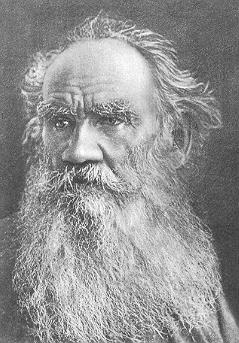
Leo Tolstoy
In C.N. 3225 we commented:
‘It is hard to imagine a more defective area of chess literature than quotations. Writers copy from one another all kinds of unverified or unverifiable phrases without any explanation, context or source.’
Here is a further example. Page 34 of Gladiatoren Ante Portas by Volker-M. Anton and Fritz Baumbach (Magdeburg, 2003) ascribes the following quote to Leo Tolstoy:
‘Ich bedauere jeden, der das Schachspiel nicht kennt. Bringt es schon dem Lernenden Freude, so führt es den Kenner zu hohem Genuss.’
English translation: ‘I pity anyone who has no knowledge of chess. While it already brings pleasure to a student, it is the source of great delight to a connoisseur.’
The book gives no source for this alleged quote. We have also seen it in a number of other German-language outlets, but never with further particulars. The first part of the remark is reminiscent of what Tarrasch wrote in his preface to Das Schachspiel (Berlin, 1931): ‘Ich habe ein leises Gefühl des Bedauerns für jeden, der das Schachspiel nicht kennt ...’ The English translation in The Game of Chess (London, 1935) was: ‘I have always a slight feeling of pity for the man who has no knowledge of chess ...’
(3949)
On page 67 of El maravilloso mundo del ajedrez (Mexico City, 2002) Emilio Carrillo Alonso unhelpfully and without further particulars attributes the ‘pity’ quote (C.N. 3949) to ‘León Tolstoi (1883-1945)’, although those are the dates of Alexei Tolstoy.
(4133)
C.N. 3949 quoted a German book published in 2003 which ascribed to Leo Tolstoy the quote ‘Ich bedauere jeden, der das Schachspiel nicht kennt. Bringt es schon dem Lernenden Freude, so führt es den Kenner zu hohem Genuss’. Richard Forster (Zurich) now points out that this quote was also ascribed to Tolstoy, again without any source, on the inside back-cover of the brochure 125 Jahre Münchener Schachclub 1836-1961:
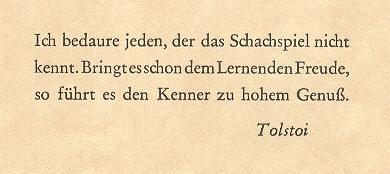
(4660)
Harrie Grondijs (Rijswijk, the Netherlands) sends this game, played by Leo Tolstoy’s son Sergius/Sergei, which was published on page 387 of Shakhmatny Zhurnal, December 1900:
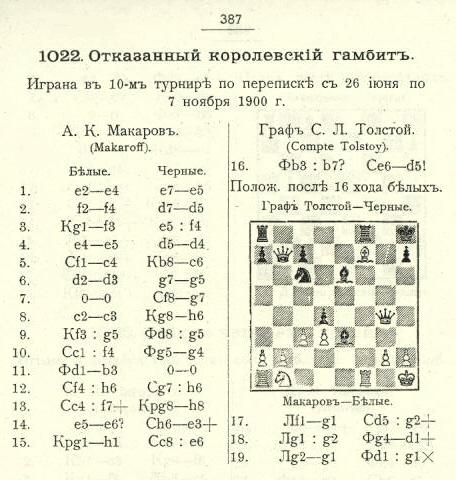
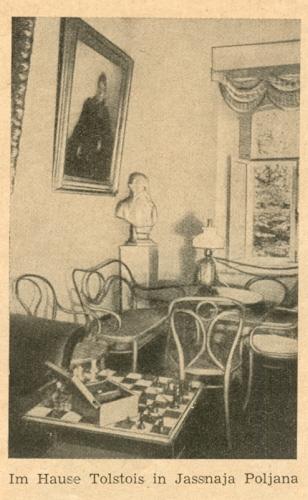
The above photograph accompanied a feature entitled ‘L.N. Tolstoi und das Schachspiel’ on page 14 of Schach-Echo, 8 January 1961.
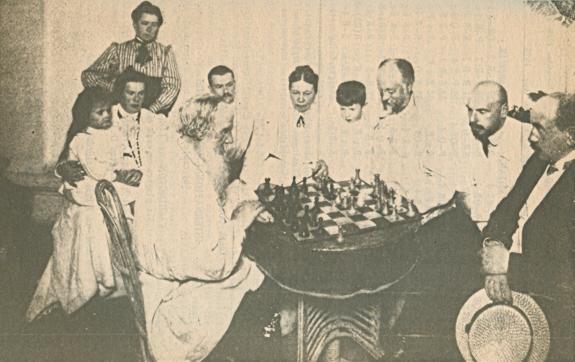
Henk Smout (Leiden, the Netherlands) comments on the famous photograph above (which we take from page 337 of The Gambit, November 1928). He notes that the board position arises after the moves 1 e4 e5 2 f4 exf4 3 Nf3 g5 4 h4 g4 5 Ne5 h5 6 Bc4 Nh6 7 d4 d6 8 Nd3.
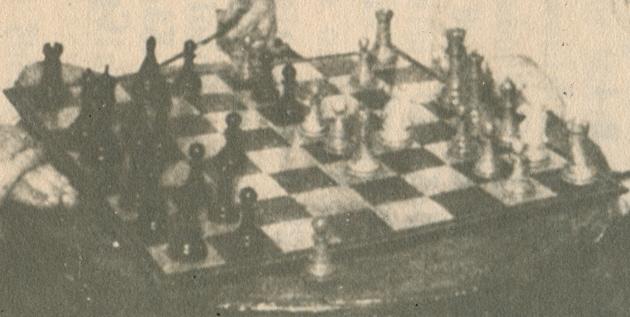
A game from pages 48-49 of Riga Match and Correspondence Games (New York, 1916):
Sergius/Sergei L. Tolstoy – Carl Behting
Correspondence tournament (Moscow v Riga), January-September
1900
Ruy López
1 e4 e5 2 Nf3 Nc6 3 Bb5 a6 4 Ba4 Nf6 5 Nc3 Be7 6 O-O b5 7 Bb3 d6 8 h3 Na5 9 d3 Nxb3 10 axb3 c6 11 b4 O-O 12 Be3 Bb7 13 Ne2 Qc7 14 Ng3 c5 15 bxc5 d5 16 exd5 Nxd5 17 Nf5 Nxe3 18 Nxe7+ Qxe7 19 fxe3 e4 20 Nd4 Qxc5 21 Nf5 g6 22 Qg4 Kh8 23 Qh4 Qb6 24 Nd4 f5 25 Qh6 Rf6 26 Nb3 exd3 27 cxd3 g5 28 Qh5 Qxe3+ 29 Rf2 g4 30 hxg4 Rh6 31 Qxf5 Bxg2 32 g5 Rg8 33 Kxg2 and Black announced mate in three moves: 33…Rxg5+ 34 Qxg5 Qh3+ 35 Kg1 Qh1.
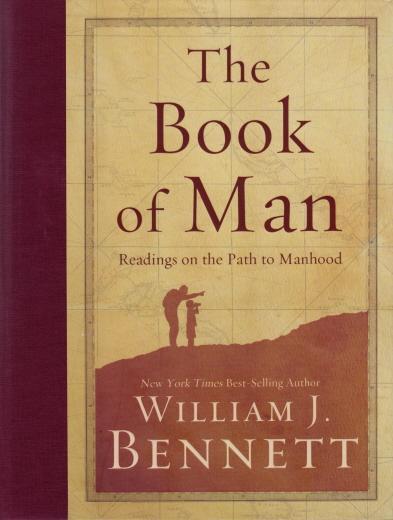
From page 208 of The Book of Man by William J. Bennett (Nashville, 2011):
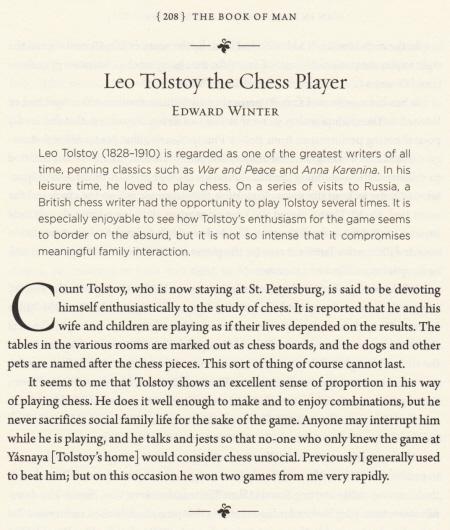
The source of these personal insights is specified in the bibliography on page 525:
As will be seen in our article above, the paragraph beginning ‘Count Tolstoy ...’ is a brief unsigned news item on page 168 of the May 1897 BCM, while the paragraph which starts ‘It seems to me ...’ was quoted by us from pages 627-628 of The Life of Tolstoy Later Years by Aylmer Maude (London, 1910).
The back cover of The Book of Man states that Dr William J. Bennett ‘served as Secretary of Education under President Ronald Reagan’.
(7462)
Christian Sánchez (Rosario, Argentina) writes:
‘On page 277 of the 28 August (old style) 1904 issue of Düna Zeitung Carl Behting’s chess column (with contributions by Friedrich Amelung) has a quote by Leo Tolstoy which was unknown to me:
“Leo Tolstoi macht folgenden treffenden Vergleich: ‘Ein Selbstmörder gleicht einem Schachspieler, dessen Partie schlecht sieht und der, anstatt mit um so größerer Aufmerksamkeit weiter zu spielen, es vorzieht, sie durch Zusammenwerfen der Figuren aufzugeben.’”’
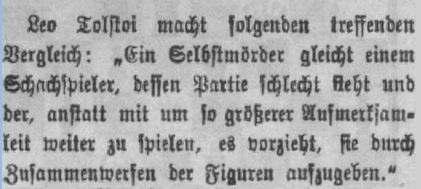
Mr Sánchez has also provided files featuring two games mentioned in our feature article on Tolstoy: Sergei Tolstoy v Behting on page 326 of the Düna Zeitung, 14 October (old style) 1900 issue, and Leo Tolstoy v Maude on page 423 of the Rigasche Zeitung, 31 December (old style) 1910 issue.
(9439)
From page 93 of The Joys of Chess by Fred Reinfeld (New York, 1961):
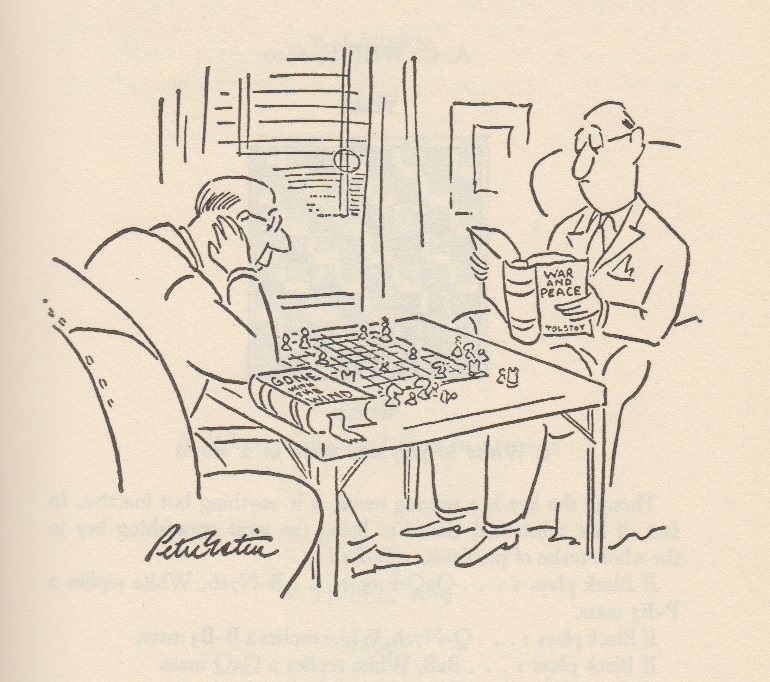
There is a cartoon of Tolstoy at the chessboard in Η ζωή μας είναι σκάκι by Κώστα Νιάρχου/Costas Niarchos (Athens, 1972).
An obituary of Aylmer Maude was published on page 452 of the October 1938 BCM. The final paragraph:
‘Maude was a first-class chessplayer and represented Essex County in the championship team for a number of years. He also appeared frequently for the National Liberal Club.’
To the Chess Notes main page.
To the Archives for other feature articles.
Copyright: Edward Winter. All rights reserved.